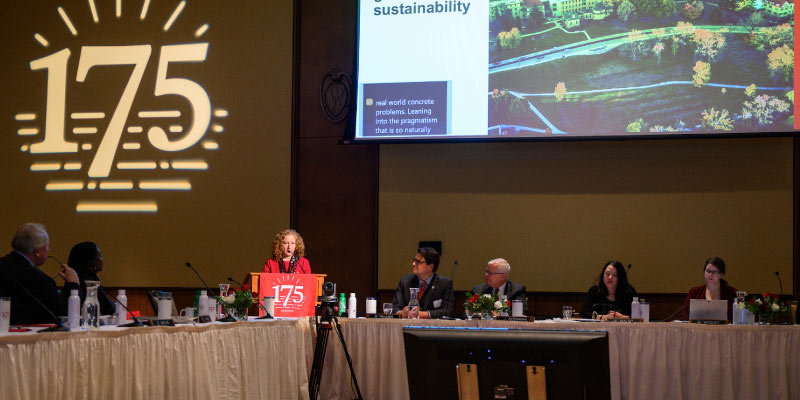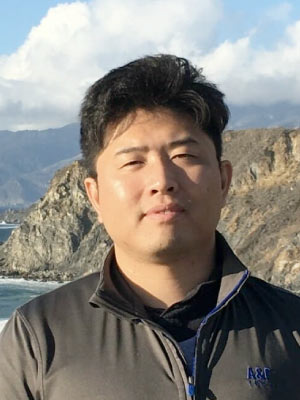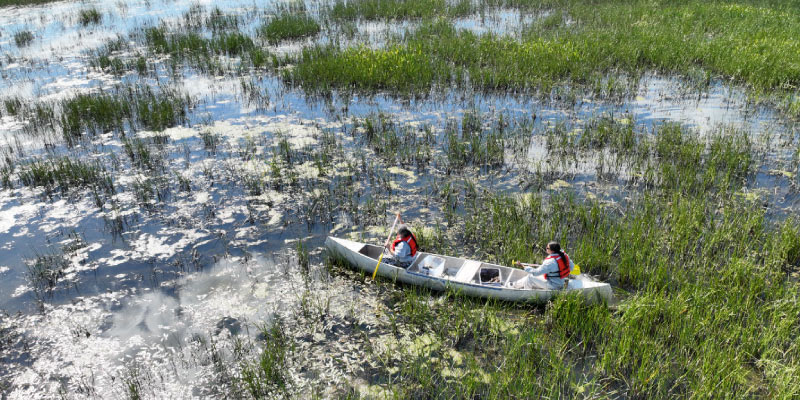
The Sustainability Research Hub (the Hub) is breaking down barriers to collaboration. Launched as a project of the University of Wisconsin–Madison Nelson Institute for Environmental Studies and the Office of Sustainability, the Hub provides administrative and grant writing supports for large interdisciplinary projects rooted in sustainability through help with interdisciplinary team building, proposal writing and editing, data visualization, budget preparation, submission coordination, and more — all free of charge. The long-term vision for the Hub is to make UW–Madison a preeminent destination for environmental sustainability research and education. The Hub team is working toward this future by catalyzing collaboration and supporting innovative, cross-cutting sustainability research on campus and beyond.
“We want to break down barriers and tear down silos!”
— Chancellor Jennifer Mnookin
In her February 8, 2024, address to the Universities of Wisconsin Board of Regents, UW–Madison Chancellor Jennifer Mnookin described the Hub as a “center of excellence intentionally designed to build on our long tradition of working across [disciplines].” Chancellor Mnookin envisions the Hub as a catalyst for transdisciplinary research, ensuring that “… every researcher in every discipline on campus has the opportunity to engage in sustainability research if they wish. We want to break down barriers and tear down silos!”
The Hub team has hit the ground running. Within the first few months of coming together, they have started transforming Chancellor Mnookin’s vision into reality and has provided various levels of support for a range of sustainability-centered projects targeting funds from several forward-looking federal programs, including
- Frontier Research in Earth Sciences, National Science Foundation (NSF)
- Environmental and Social Sustainability in Engineering Education, NSF
- Earth Action: Community Action for Equity and Environmental Justice, NASA
- Land-Cover and Land-Use Change, NASA
- Responsible Design, Development, and Deployment of Technologies, NSF
- Transformative Approaches to Graduate Education, NSF
- Environmental and Climate Justice Community Change Grants Program, Environmental Protection Agency
- Sustainable Regional Systems Research Networks, NSF
- Resiliency Innovation Engine (Water/Energy), NSF
- Energy and Emissions Intensive Industries, Department of Energy

In January, the Hub provided editorial and research administrative support for a project led by senior scientist Feng He of the Nelson Institute’s Center for Climatic Research. He’s project team includes researchers from Japan, New Zealand, Canada, the NSF National Center for Atmosphere Research, and other U.S. universities. This interdisciplinary group looks to develop transformative Earth system models that accurately simulate past and future glacial cycles, sea-level fluctuations, and climate change. This work would revolutionize climate modeling for future ice sheet and sea level projections by providing open-source modeling tools that account for interactions among ice sheets, atmospheric processes, carbon dioxide levels, ocean circulation, and geologic processes within the solid Earth.
The Hub is also providing grant writing, budget preparation, and research administration services for a transdisciplinary community change project led by Jessie Conaway, faculty associate for Native Nations Partnerships at the Nelson Institute. This effort is a continuation and scale-up of the already successful InterTribal Lake Winnebago Wild Rice Revitalization Project, a collaborative effort between Tribal Nations, university researchers, community partners, and government agencies. The work integrates water quality data from Western scientific methods within a holistic framework of traditional ecological knowledge to restore wild rice to harvestable levels in Lake Winnebago waterways. The project also educates communities about the ecological benefits of wild rice.

The Hub team has also been building opportunities for on-campus connections around sustainability. For example, they are working to expand the UW–Madison Sustainability Experts Database for researchers seeking collaborative opportunities. The database currently has 187 participants and continues to grow. All campus researchers who are interested in sustainability are encouraged to join, as the database will be used to identify potential project teams and build networks across campus.
Other recent outreach included hosting a brainstorming meeting that brought together an interdisciplinary group of researchers around an important Department of Energy (DOE) funding opportunity. The meeting was attended by 15 faculty from various departments who discussed collaborative opportunities in the DOE focus area of energy- and emissions-intensive industries. This Hub-prompted discussion included researchers from the Nelson Institute and the Departments of Civil and Environmental Engineering, Chemistry, Mechanical Engineering, Biological Systems Engineering, Soil Science, and Materials Science. The Hub plans to continue catalyzing collaboration through future brainstorming sessions that will bring together interdisciplinary teams around unique funding opportunities.
Meet the Hub during Earth Fest
Sustainability Research Networking and Brainstorming
Wednesday, April 24 | 3–4:30 p.m.
Learn more